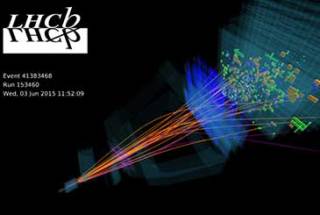Nov 28 2015
The University of Bristol’s Particle Physics Group has been awarded a £3.5 million grant by the Science and Technology Facilities Council (STFC) to support the group’s work at the CERN Large Hadron Collider (LHC) and elsewhere for the next four years.
 One of the first 13 TeV collisions recorded by LHCb. Image credit: CERN
One of the first 13 TeV collisions recorded by LHCb. Image credit: CERN
The award covers Bristol’s high-profile research on the Compact Muon Solenoid (CMS) and LHCb experiments at the CERN LHC, including analysis of the new highest energy collision data. It will also support work on a number of smaller experiments, as well as research and development for future applications both within particle physics and in other fields.
The LHC is the world's highest energy particle accelerator. After an almost two year shutdown and several months’ re-commissioning, the LHC began delivering physics data again in June this year. Since then, it has been providing collisions to its experiments at the unprecedented energy of 13 TeV, almost double the collision energy of its first run.
The energy of the colliding protons is such that new particles much heavier than the proton can be created. These exotic new particles include bottom and top quarks, and the long sought-after Higgs boson.
CMS was one of the two experiments that discovered the Higgs boson at the LHC in 2012. The Bristol CMS group will be looking at the new collision data to study top quarks in detail and to search for evidence supporting new theories of physics such as supersymmetry, which may help explain why the Higgs boson is so light.
The LHCb experiment looks mainly at the production and decay of bottom quarks, searching for subtle differences between matter and antimatter that could explain why the Universe appears to be made almost entirely of matter. The Bristol LHCb group expects to make several world-leading measurements that could help find an explanation.
The technology used to image the collisions in experiments at the LHC has wide application in other fields. The award will help fund the group’s work on applying particle physics detectors to improve radiotherapy in hospitals and even to image the inside of volcanos.
Professor Joel Goldstein, Head of the Bristol Particle Physics Group, said: ‘This grant is a great success for Bristol at a time of tight constraints on government funding, and recognises the group’s excellent track record and exciting future programme.
‘The LHC restart has created a wealth of new data to analyse already, and this will increase exponentially over the next few years. This grant will fund us until 2019 in the search to understand the most fundamental building blocks of matter and the laws of nature at the smallest scales. Our researchers will be at the forefront in answering some of the biggest questions in science, such as why is the Universe made of matter, what is dark matter and what is the nature of the Higgs boson?’
Source: http://www.bristol.ac.uk/